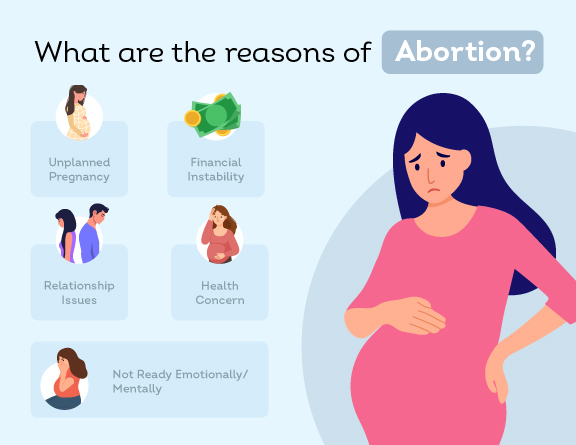
Select City
Abortions in the second trimester are safe and can be carried out using a surgical method called Dilation and Evacuation (D&E). The second trimester of pregnancy starts at 14 weeks and ends at 26 weeks. For a second-trimester abortion, consult with the expert gynecologists at Pristyn Care and get a safe termination of your pregnancy. To consult with our expert gynecologists, reach out to our team today.
Abortions in the second trimester are safe and can be carried out using ... Read More




Free Consultation

Free Cab Facility

No-Cost EMI

Support in Insurance Claim

1-day Hospitalization

USFDA-Approved Procedure
Choose Your City
It help us to find the best doctors near you.
Bangalore
Chennai
Coimbatore
Delhi
Hyderabad
Kolkata
Mumbai
Noida
Pune
Thiruvananthapuram
Delhi
Hyderabad
Pune
Mumbai
Bangalore

Unmarried/Single Allowed

Affordable and Inclusive

Experienced Lady Doctor

Expertise 12-24 Weeks

No Partner/Spouse Consent

Highly Confidential
| Do's | Don'ts |
|---|---|
| Ultrasound is essential before Abortion | Never take medical pills from chemist |
| Blood Tests are necessary before Abortion | Never test home remedies |
| Check Govt. Registration Certificate of the Center | Never visit unregistered/unapproved center |
| Consult Gynaecologist before abortion procedure | Don't go to quacks or unqualified person |
Many of the unpleasant early pregnancy symptoms go away during the second trimester, which is often regarded as the “honeymoon period.” You’ll probably sleep better and have more energy. Nonetheless, some women suffer from heartburn, constipation, leg cramps, and back or abdominal pain. An ultrasound technologist takes the baby’s measurements during the anatomy ultrasound. You may feel your baby’s first movements between 16 and 20 weeks, which is also referred to as “quickening.”

Fill details to get actual cost
During the second trimester, the majority of early pregnancy symptoms, such as morning sickness and excessive fatigue, usually lessen or even go away. By the beginning of the trimester, the fetus has developed all of its organs and systems, and will now begin to gain weight and length. Most women experience their baby’s first movement during the second trimester, usually by 20 weeks.
Pregnancy is usually most enjoyable during the second trimester. Second trimester symptoms include bodily changes such as,
Up to 20 Weeks


Between 20-24 Weeks
Diet & Lifestyle Consultation
Post-Surgery Free Follow-Up
FREE Cab Facility

24*7 Patient Support
The following tests are being performed during the second-trimester abortion procedure:-
A surgical evaluation of the uterus is done for the 20-26 weeks of pregnancy. The doctors prioritise the patient’s safety throughout the procedure with proper follow-up care and instructions.
The following are the methods for MTP in the second trimester.
D&C is a surgical procedure and is also called vacuum aspiration or suction curettage. It is usually performed up to 16 weeks of gestation. During the procedure, the cervix is dilated and a thin instrument is used to remove the tissue from the inside of the uterus(curettage).
The D&E is also known as a procedural or surgical abortion and is the most widely used method for above 16 weeks or pregnancy. The D&E procedure consists of two parts: evacuation of the products of conception (with suction, extraction forceps, and curettage) and preparation of the cervix(dilating the cervix with osmotic, pharmacologic, and/or mechanical dilators).
It is a less common method and works through injecting substances, such as saline solution, urea, or potassium chloride, to induce labour.
You will receive information regarding the procedure, undergo an examination and ultrasound, and may be given oral pain/anxiety medications in a private examination room. The doctor may also prescribe antibiotics and painkillers. It is crucial that you adhere to your doctor’s instructions.
Depending on your gestational age and medical history, cervical softening and dilating are carried out with medication and/or tiny dilating sticks, known as laminaria or Dilapan. Made from a unique seaweed substance, laminaria are thin sticks that widen when they absorb moisture from your body. Dilapan are synthetic sticks that function similarly. To help your body get ready for the surgery, the dilators will remain in your cervix overnight, allowing cervical dilatation to occur gradually.
You might return for a second day of pre-op, where new dilators will be inserted and the old ones removed, depending on your gestational age. Additionally, you can get an injection that causes fetal death inside your uterus. You will be conscious throughout the dilator insertion. The physician will:-
You will be allowed to rest for a short while after the treatment. You may also experience spotting and cramps. If you take painkillers or anti-anxiety medications, someone has to drive you home. You are advised to rest at home until the effects of the medications wear off. After your pre-op visit, it is advised that you spend the remainder of the day relaxing at home. On the day before your surgery, avoid eating or drinking anything after midnight.
The medicine will be injected intravenously (IV) into your arm once you are in the treatment room, to induce anaesthesia or loss of consciousness. The majority of patients fall asleep and do not remember the process. Once you’re comfortable, the doctor will remove the laminaria and use gynecological devices and mild suction to empty your uterus under ultrasound monitoring. Although the surgery will probably only take 15 to 30 minutes, you will spend around an hour in the operating room.
The hospital staff will monitor you for roughly two hours in the recovery room. You might get some spotting and cramping. The entire process and recovery period at the hospital often takes six to eight hours. You shouldn’t drive until the effects of the medicines wear off. You should be able to resume your regular activities, including work and school, the next day.
Surgical abortion at 2nd trimester is considered one of the safest medical procedures. However, a few of the rare complications, include the following:-
In India, women have the right to terminate their pregnancy during the second trimester and up to 24 weeks gestation, provided a qualified doctor deems it appropriate. However, certain conditions must be met, including:
It is important to note that abortion laws change over time, and individuals seeking abortion should seek advice from a healthcare provider or legal professional for the most up-to-date information on this.
In India, the law permits women to get their abortions only till 24 weeks of pregnancy. Abortion in the 27th week of pregnancy, however, may be allowed in very specific cases, especially if there’s a risk to the life of the mother or the child. Currently, the MTP Act allows women to terminate their pregnancy up to 24 weeks.
Abortions in the second trimester are considered safe and most women recover seamlessly after their abortion. However, the safety of abortions relies heavily upon where the abortion is being done, among other factors. The risks and complications can further differ based on individual circumstances. It’s important to consult with a healthcare provider to discuss the specific risks and benefits based on your health and gestational age.
Eligibility for a second-trimester abortion in India depends on various factors, including the woman’s health, fetal abnormalities, and other medical considerations. Legal restrictions and guidelines may also play a role. Consulting with a healthcare provider and understanding local laws is essential to determine eligibility.
Generally, abortion pills are more commonly used in the early stages of pregnancy. In the second trimester, surgical procedures are recommended. It is crucial to consult with a healthcare provider to discuss the most appropriate and safe method for terminating a pregnancy based on its gestational age.
Once a second-trimester abortion is initiated, it is typically not reversible. It’s essential to make well-informed decisions and consult with healthcare professionals before proceeding with any abortion to avoid complications or misunderstandings.
Anesthesia may be used during second-trimester abortions to ensure the patient’s comfort and safety. The type and extent of anesthesia can vary, and healthcare providers will assess the individual’s health and the specific procedure to determine the appropriate level of anesthesia.
To determine if a clinic or hospital is certified to provide abortions, you can check with local health authorities or regulatory bodies. Accreditation, licensing, and adherence to medical standards are crucial indicators. Additionally, you can ask the healthcare provider about their credentials and the facility’s certification for providing abortion services.
The best method for a second-trimester abortion depends on factors such as gestational age, medical history, and individual circumstances. Common methods include dilation and evacuation (D&E). Consultation with a healthcare provider is essential to determine the most suitable and safe method based on specific conditions.
Using ultrasound guidance, the doctor removes the laminaria and uses suction and gynecological instruments to empty your uterus. The procedure takes approximately 15 to 45 minutes, but you will be in the operating room for about half an hour.
Mid-trimester pregnancy termination done after 12 or 13 weeks of gestation is a safe and effective medical procedure. It is done using two common methods, such as surgical abortion and medical abortion.
Supriya, 27 Yrs
Recommends
My mistake was about to cost me my life. Had unplanned pregnancy before my wedding which could ruin everything for me. 1 month into it and i was so worried about the consequences. A friend recommended me to visit abortion centre in delhi. Thank god i listened and went to it. Dr Aria Raina thank you soo much for your support.
Rashmi , 34 Yrs
Recommends
I had a health condition and i am a single mother. Accidently got pregnant due to contraceptive failure. Had the smoothest process for abortion in delhi at pristyn care clinic. I can't believe how they managed every thing on the same day itself. They also informed that all my files and details are listed as confidential so i need not to worry about my privacy though i never cared for it. Since raising a child alone has made me stronger than before
Pihu Roy
Recommends
Some time ago, my wife fell on the roof while she was pregnant. Due to this incident, we sadly lost the baby, and an abortion was decided upon. Thank you to Dr. Deepthi for her excellent care.
Lisha, 19 Yrs
Recommends
She explained us about condition and everything she was really calm and soft
Anjali Verma
Recommends
I was extremely nervous before the procedure, but the staff at Pristyn Care were really supportive. Dr. Surbhi explained everything so well. Felt safe and cared for.
.svg)